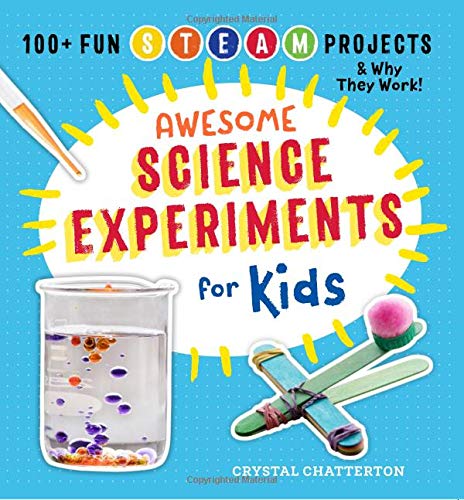On this page: General Resources
earth & space pages
general resources
📖 Earth Science for Every Kid by Janice Van Cleave. This entry in Van Cleave’s Every Kid series introduces kids to fundamental concepts in Earth Science through hands-on experimentation. In Unit I, students explore Earth’s place in the Solar System (day and night, seasons). Units II–V and VII cover topics in Geology (rocks, minerals, crustal movement, erosion, oceans, and atmosphere). Unit VI focuses on Meteorology. The simple experiments and clear explanations recommend this book as a good supplemental resource. – Elementary
📖 Awesome Science Experiments for Kids by Crystal Chatterton. This terrific book features over 100 projects divided into six chapters. The layout is visually appealing, the experiments are well-conceived, and the “Hows and Whys” section clearly explains the scientific reasoning behind the results. Find specific experiment suggestions across the topic pages. – Elementary
📖 Middle School Earth Science from CK-12. CK-12 Foundation offers free digital textbooks for all grade levels. This “Flexbook” covers Geology, Meteorology, Ecosystems, Evolution, the Solar System, and the Universe. The text is modular: for each topic, the student reads an article, perhaps watches a short video, and completes practice problems. This organization has advantages and disadvantages – it’s easy to dip into, but the overall text can feel disjointed and superficial. – Middle
💻 Steve Spangler Science. Steve Spangler is something of a science demo celebrity. On his website, you will find many scientific demonstrations, videos, and experiments, some more complex than others. As you browse the science pages of Best Homeschool Resources, you will find recommendations for experiments that align with specific topics of study. – All
💻 Citizen Science Projects. Citizen Science projects allow members of the public to contribute to ongoing scientific research. Some initiatives have a local focus, while others are conducted nationwide or online. Search the SciStarter database to find projects that align with your child’s age and interests. – All
▶️ MinuteEarth. MinuteEarth makes a lot of really short, fun, and informative animated videos – their mission is to share “science and stories about our awesome planet!” Despite the name, the videos actually cover a wide range of topics, from Earth Science to Biology and beyond. Check out the Earth Science subpages to find MinuteEarth videos that correlate with specific topics, and for more great videos, browse the full playlist below. (Click the three horizontal bars in the upper right corner of the video screen below to select and watch any video in the series.) – All
▶️ Crash Course Astronomy. Narrated by Phil Plaitt, this series is geared toward high school students but can be used to supplement an upper Middle School Earth & Space study. Episodes 1–8 discuss phenomena that affect us here on Earth (eclipses, gravity, tides), while Episodes 9–23 and 47 take us on a tour of the Solar System. Episodes 24 and 25 touch on Light and Distance, and Episodes 26–46 branch out to the wider Universe where we learn about stars, black holes, galaxies, dark matter, dark energy, the Big Bang, and much more. (Click the three horizontal bars in the upper right corner of the video screen below to select any video in the series.) – Middle • High
▶️ PBS Space Time Hosted by Matt O’Dowd, the PBS Space Time video series is a great supplement for older students (and adults) who are seriously interested in astronomy. O’Dowd takes on some really complex topics and covers recent scientific advances in astronomy. The videos, while challenging, are interesting, scientifically-sound and well-produced. (Click the three horizontal bars in the upper right corner of the video screen below to select any video in the series.) – Middle • High












